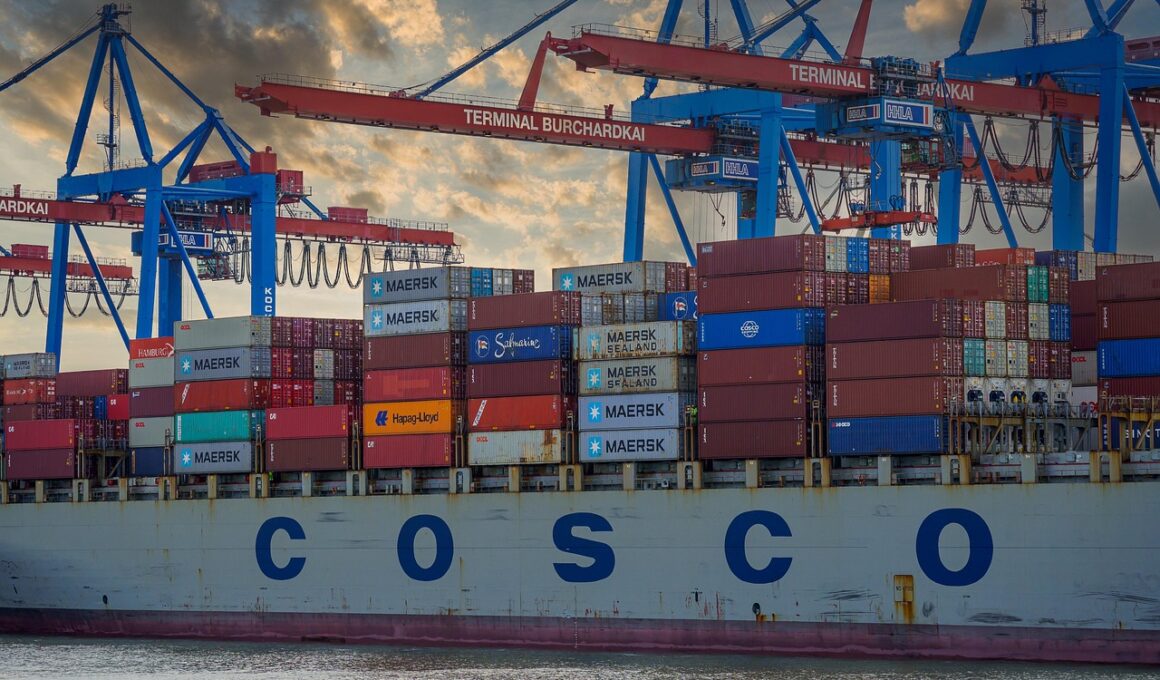Global Supply Chains: Economic Theories and Industrial Implications
In an era defined by rapid globalization, understanding the implications of global supply chains on industrial economics becomes essential. As firms expand their operations across borders, diverse economic theories provide insights into their strategies and outcomes. These theories include transaction cost economics, which examines the cost of exchanges, and game theory, which explores competitive and cooperative strategies among firms. Moreover, the resource-based view emphasizes firm-specific resources and capabilities as key drivers of competitive advantage in global markets. Analyzing supply chain dynamics through these lenses sheds light on how companies optimize efficiency and reduce costs. The development of technology further complicates these theories, highlighting the need for adaptability and innovation. The ability to navigate supply chains effectively can determine a firm’s profitability and market position. As industrial economics evolves, businesses must re-evaluate their approaches to global supply chains, integrating advanced economic theories to enhance decision-making processes. Ultimately, the success of companies in international trade relies on their understanding of these economic principles, making the study of global supply chains a vital area for research and strategic development.
In understanding global supply chains, the role of economic theories becomes increasingly significant. One of the pivotal concepts is the theory of comparative advantage, which posits that countries benefit from specializing in the production of goods and services that they can produce most efficiently. By leveraging their unique strengths, nations create more efficient trade relationships and foster industrial growth. This principle is evident as various countries focus on their core competencies, enabling them to participate in global trade networks. Supply chains, therefore, often reflect the advantages different regions hold in terms of resources, labor costs, and technological capabilities. Additionally, the integration of logistics into industrial economics showcases how firms harness these advantages to optimize performance. Advanced logistics techniques, including just-in-time inventory and demand forecasting, enhance operational efficiency. Furthermore, firms must stay attuned to economic fluctuations and market demands, adjusting their supply chains accordingly. This flexibility enables businesses to remain competitive in a volatile environment. Embracing these economic theories empowers firms to strategically manage their supply chains, thereby maximizing output while minimizing costs, leading to sustained economic viability in the global landscape.
The impact of technology on global supply chains and industrial economics is profound. Technological advancements streamline processes, enhance communication, and facilitate information sharing across international borders. Innovations such as blockchain technology and artificial intelligence redefine the boundaries of efficiency and transparency in supply chain management. For instance, blockchain can improve traceability of products, fostering consumer trust while minimizing fraud. Simultaneously, AI algorithms optimize logistics by predicting demand patterns, thus enabling better inventory management. These technological shifts not only improve operational efficiency but also reshape competitive dynamics in global markets. Firms leveraging technology gain a significant edge over their rivals, illustrating the importance of innovation in economic theories surrounding supply chains. Moreover, the adoption of Industry 4.0 concepts transforms traditional manufacturing approaches, integrating cyber-physical systems with supply chain operations. As industries become increasingly digitized, understanding the interplay between technology and economic principles becomes essential. To thrive in this environment, businesses must continuously adapt and evolve, aligning their operational strategies with the latest technological trends. This transformation ensures they remain relevant and competitive in an ever-changing global economic landscape.
Challenges in Global Supply Chains
While the benefits of global supply chains are considerable, several challenges could undermine their efficacy in industrial economics. Geopolitical tensions, trade tariffs, and logistical hurdles present significant obstacles for firms operating internationally. The unpredictable nature of international relations can disrupt supply chains, leading to increased costs and delayed deliveries. Additionally, varying regulatory environments across countries complicate compliance, further impacting operational efficiency. Companies must develop robust risk management strategies to navigate these challenges effectively. This could include diversifying suppliers and establishing contingency plans to mitigate potential disruptions. Furthermore, fluctuations in currency exchange rates can significantly affect pricing strategies and profit margins. Businesses must stay informed about global economic conditions to protect their interests. Increased scrutiny surrounding sustainability practices also poses challenges, as consumers demand more ethical supply chain management. Focusing on sustainable sourcing and ethical labor practices can differentiate companies in the marketplace. By addressing these challenges, firms can enhance their resilience and adaptability. Success in the global landscape hinges on the ability to foresee and navigate these complexities, making proactive management a crucial aspect of industrial economics.
Supply chain resilience has emerged as a critical component in industrial economics, particularly in light of recent global disruptions. Events such as the COVID-19 pandemic highlighted vulnerabilities in existing supply chain frameworks, prompting firms to reassess their strategies. Building resilient supply chains involves creating systems capable of adapting to varying circumstances and shocks, thereby ensuring continued operation and supply continuity. This resilience can be achieved by investing in technology, fostering collaboration with partners, and adopting flexible practices that can withstand unexpected changes. Economic theories emphasizing risk and uncertainty play a vital role in this discussion, as firms strive to balance efficiency with robustness. Additionally, firms must evaluate their suppliers based on resilience criteria, ensuring they can withstand disruptions while maintaining quality and service levels. Strategies such as nearshoring and local sourcing also contribute to supply chain resilience, reducing dependence on distant suppliers. Ultimately, enhancing resilience will enable firms to navigate challenges effectively, providing a competitive advantage in a dynamic industrial landscape. The focus on building resilient supply chains presents new opportunities for innovation and strategic development within industrial economics.
The Future of Global Supply Chains
As industries evolve, the future of global supply chains will continue to be influenced by economic theories and technological advancements. Increased automation and integration of smart technologies will shape supply chain operations, enhancing productivity and minimizing costs. The rise of e-commerce demands more agile and responsive supply chains, as businesses strive to meet consumer expectations for fast delivery. Additionally, sustainability will drive future supply chain strategies as companies face pressure from stakeholders to practice responsible sourcing. Future economic theories will likely address the importance of sustainable practices and their impact on long-term profitability. Moreover, emerging markets will play a significant role in global supply chains, as countries in Asia, Africa, and Latin America become vital players. The shift in manufacturing bases away from traditional powerhouses towards developing nations is indicative of this trend. Firms must remain attuned to these changes, evaluating new opportunities while mitigating potential risks. This reorientation of supply chains will also require firms to leverage partnerships and innovate continually, ensuring they adapt to market demands and maintain competitiveness in a rapidly changing landscape.
In conclusion, the study of global supply chains through the lens of economic theories and industrial implications is paramount for contemporary businesses. Companies that understand and apply these theories can optimize their supply chain frameworks to enhance efficiency while minimizing costs. Technological innovation is a key driver of success, enabling firms to respond swiftly to market changes and consumer demands. As global dynamics continue to evolve, the challenges associated with supply chains will persist, necessitating strategically adaptive approaches. Resilience will become a crucial aspect as disruptions, whether geopolitical or health-related, become increasingly common. By staying committed to sustainability and responsible practices, companies not only protect their brand reputation but also align with consumer values, positioning themselves for future success. With firms facing mounting pressure to operate efficiently and sustainably, economic theories will provide the necessary frameworks for decision-making. As we move forward, the integration of technological advancement with a keen understanding of economic principles will define the success of global supply chains. Consequently, businesses must remain agile and proactive in evolving their supply chain strategies to maintain a competitive edge in this intricate landscape.
Understanding the implications of global supply chains requires an integration of economic theory and practical application within industrial economics. This not only enhances operational efficiency but also fosters the sustainability needed for competitive advantage.





